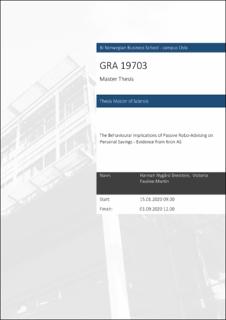The Behavioural Implications of Passive Robo-Advising on Personal Savings - Evidence from Kron AS
Master thesis

View/
Date
2020Metadata
Show full item recordCollections
- Master of Science [1621]
Abstract
The political shift and technological development since the 2008 financial crisis
have shaped a new era, taking financial wealth management to robo-advisory (RA).
This thesis studies the behavioural implications of a Norwegian passive roboadvisor
(RAr) that constructs tailored saving plans for retail investors. These
implications are investigated on individual and stereotype saving behaviour. Main
results show, that changes to invested capital and expected investment horizon are
the most relevant factors for diverse successes in passive robo-advising. Investors
providing supplementary capital at later points in time acquire a 3.4% higher Assets
under management (AUM) than investors who keep their invested capital constant.
Those who withdraw funds from the RAr marginally decrease their AUM. This
adjustment behaviour is different for distinct investor groups. Trend-chasing does
not explain this difference. Deviations from intended saving behaviour in the roboadvisor
are greater for stereotypes around age, gender, and residence, where age
was the main driver. Differences between stereotypes were reduced over time,
however individual differences in behaviour were not. To be beneficial for personal
savings, passive robo-advising has to be extended from pure portfolio advice to
counsel on adjusting invested capital. Identified possible solutions are to
incorporate indiidali in he adisors csomer assessmen and notifying on
potential pitfalls concerning adjustments to invested capital.
Keywords - Robo-Advisory, FinTech, Behavioural Finance, Personal Traits,
Stereotypes, Decision-making, Investment Behaviour
Description
Masteroppgave(MSc) in Master of Science in Finance - Handelshøyskolen BI, 2020/Masteroppgave(MSc) in Master of Science in Business, Finance - Handelshøyskolen BI, 2020